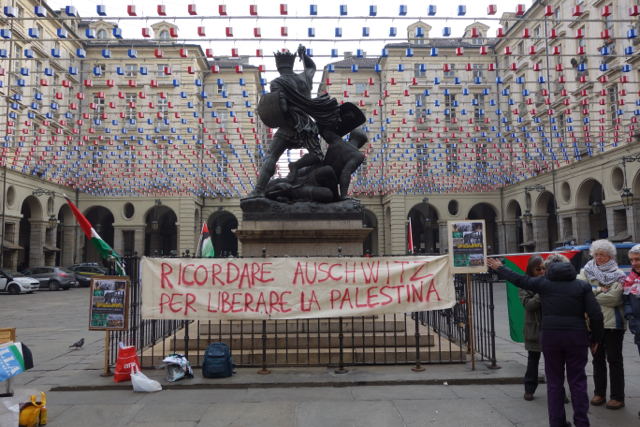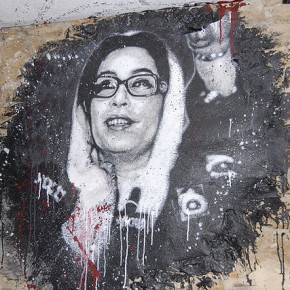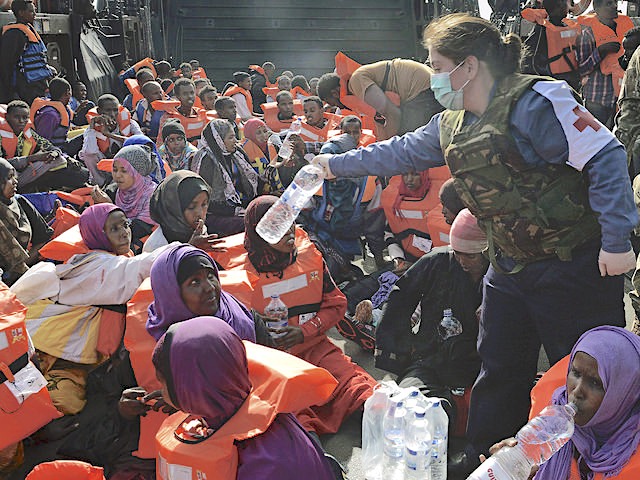For a moment, I thought I was in Israel. “Why are there Palestinian flags here?” I wondered, as I approached city hall. Its website had said that an event to commemorate the Holocaust would be held here, facing its entrance. I’d expected there would be Israeli flags instead, with bearded Jewish men davening for good measure.
In their place stood small collection of keffiyeh-wearing leftwing activists, handing out flyers to passersby, the sound of Arabic-language hip-hop playing in the background. It may have even been the new DAM album.
Even though I’d gotten the political nature of the event wrong, I had gone to great lengths to be there. Few annual commemorations in Turin boast such striking political posters as Holocaust Memorial Day. Unused to seeing public poster art of that political nature, the journalist in me assumed there would be some kind of cultural activity worth recounting – if I could only get myself out of bed, and out into the cold, in time. Little did I know what I would end up witnessing, and how significant it would come to be, after the fact.
A Palestinian solidarity demonstration, replete with a banner stating “Remember Auschwitz by Liberating Palestine,” (see the lead photo) there was nothing especially controversial about it. A small police contingent stood across the street, looking rather bored. It was business as usual, at least for Turin. Not, as I would discover the next morning, eighty minutes north, at Milano Centrale, Milan’s old railway station. There, at an event meant to commemorate the 7,000 Italian Jews, shipped by rail, to their deaths in concentration camps, Silvio Berlusconi, the leader of Italy’s largest rightwing party, sang the praises of dictator Benito Mussolini, and fascism, downplaying Il Duce’s role in the Nazi genocide.
The contrast was instructive. Not just between Turin and Milan, but also between right, and left, in Italy. What was a more appropriate way to remember the Holocaust? The choices were stark. Do as Berlusconi does, and write off the event, as an unfortunate consequence of an otherwise good era. Or, as Turin’s leftists argue, end the occupation of Palestinian territories, which, irrespective of one’s political position, is an undeniable consequence of the Holocaust? You be the judge. Note how the leftists qualify their politics as being anti-fascist, as well as anti-colonialist. Berlusconi’s stated affection for the Mussolini era gets especially complicated after that.
The following flyers were distributed at the Turin event. As with every Randomizer entry, translations are included.

ANTI-FASCIST AND ANTI-ZIONIST MEMORIAL DAY
WE COMMEMORATE THE NAZI-FASCIST EXTERMINATION OF THE JEWS
AND THE ZIONIST MASSACRES OF THE PALESTINIANS
“I’m convinced that Israel, as Jewish State, is a threat not only for itself and its citizens, but for all the Jews and other peoples and states of the Middle East and elsewhere, as well.”
From “Jewish History, Jewish Religion: the weight of three thousand years” by Israel Shahak, survivor of the Bergen – Belsen extermination camp
Established in 2000 in Italy, the Memorial Day is an international anniversary celebrated every year on the 27th of January in commemoration of National Socialism and fascism’s victims, therefore particularly loved by Jewish communities in Italy and in other European countries. The choice of the date is related to the liberation of Auschwitz concentration camp by Soviet Red Army, on 27th of January 1945.
We believe that this event is very important, also because the Holocaust commemoration must serve as stimulus to all anti-fascists to hinder attempts by right wing extremists to return to the political scene, attempts often tolerated by “democratic” institution (see Turin city council that has authorized the Forza Nuova demonstration in city center last 15th of December.) From many sides, however, it has been underlined by the necessity not to use, during the commemorations, the sufferings of Jews to legitimate another policy of violence and authoritarianism, that is, the one adopted by Israel on the basis of Zionist ideology.
It’s more and more urgent to discuss a process of decolonization of the Zionist state and of the foundation on the whole Palestinian territory of a unitary country in which Jews and Arabs have equal rights.
We invite you to the counter-information demonstrations about these themes in Turin:
SATURDAY 26TH JANUARY AT 3 PM PIAZZA MADAMA CRISTINA
SUNDAY 27TH OF JANUARY AT 10.30 AM PIAZZA PALAZZO DI CITTA’
(on the occasion of official commemoration)
FOR THE ENDING OF OCCUPATION AND APARTHEID
FOR THE RIGHT OF THE REFUGEES TO GO BACK
FOR THE BOYCOTT OF ISRAEL
for a Unitary and Democratic State in Palestine, in which Arabs and Jews have equal rights
ODS One Democratic State

[Arabs to the Gas Chambers photo]
writing on a Palestinian house wall in Hebron
About ten years ago, during the Second Intifada, B. Michael, (a) practicing Jew whose parents survived the Nazi extermination, (and a) columnist for the Israeli daily newspaper Yedioth Aharonot, after hearing that Israeli soldiers had tattooed the star of David on a Palestinian prisoner, on the 15th of March 2002 published a text entitled “From branded to branders”:
In only sixty years
from branded to branders and tattooers.
In sixty years
from prisoners in the ghettos to imprisoners.
In sixty years
from plundered to plunderers.
In sixty years
from those marching in columns with their hands up
to those who compel others to march in columns with their hands up.
In sixty years
from being crushed in the name of a cruel nationalism
to those who crush in the name of a cruel nationalism.
In sixty years
from being victims of a wretched moving policy
to the more and more enthusiastic support of a wretched moving policy.
During all these sixty years we haven’t learned anything,
nothing we have interiorised.
We have forgotten everything.
Translated from the Italian by Giulia Pace. Introduction and photographs courtesy of Joel Schalit.






These images and texts represent a perverse misappropriation and grotesque distortion of history. It is a form of racist defamation, one that merges genocide’s victims with its perpetrators. Certain sectors of the European left have profoundly problematic ideological issues with Jews, arguably a modern secular translation of historic religious antisemitism. Thanks for this documentation.
In my city, in Italy, there is the only Italian concentration camp, Saint Sabba. Remembering the Holocaust doesn’t mean proving pity for the Jews dead during WW2. I think it means to remember the past to condemn every holocaust, including actual ones, like the one Israel is committing right now.
I agree with the message.